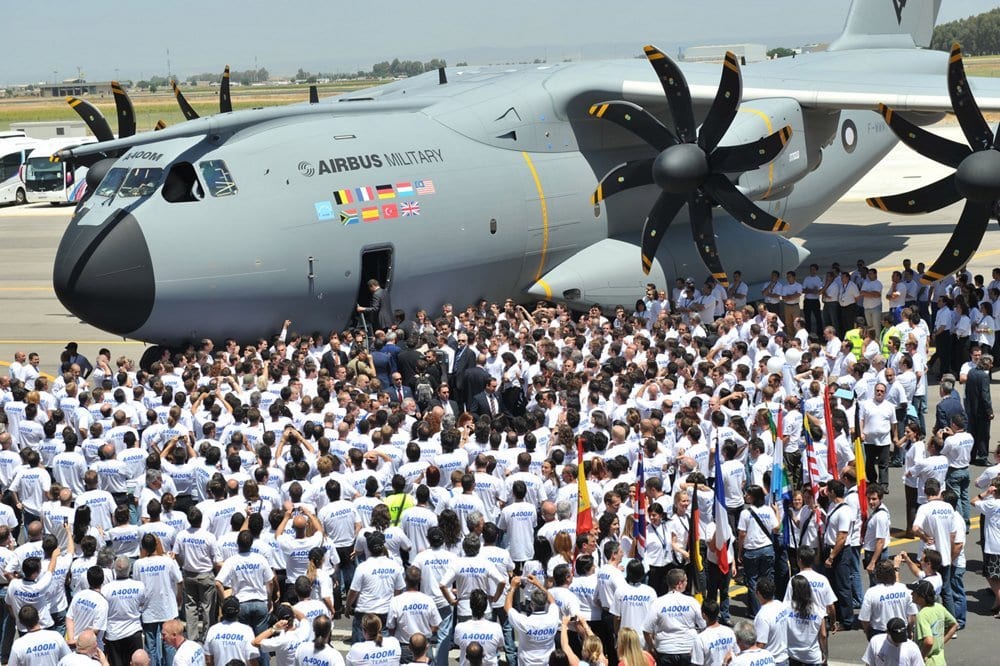
Airbus will lead development of New Generation Fighter (NGF) and be the prime contractor in the low observability domain of the nation’s European Future Combat Air System (FCAS) Program. Pictured here is a ceremony celebrating the rollout of the first A400M military transport aircraft completed at the final assembly line in Seville, Spain.
Airbus will lead development in Spain for the New Generation Fighter (NGF) and be the prime contractor in the low observability domain of the European Future Combat Air System (FCAS) Program, according to a Dec. 9 announcement from Airbus its Trade Media Briefing. The announcement follows Spain’s official onboarding in the Joint Concept Study and Phase 1A of FCAS.
“With the official signature of the Spain industry contracts, all 3 partner nations and their industries are fully on-boarded on #FCAS which will be the largest European defense collaborative programme for the 21st century,” Bruno Fichefeux, head of the FCAS Program, said during the briefing according to a tweet posted by Airbus.

A mockup of the FCAS next generation fighter jet at the 2019 Paris Air Show. Photo: ANSYS
FCAS, the European combat system of systems, is under development by Thales, Indra Sistemas, and Dassault Aviation and includes development of the NGF, remote carrier, combat cloud, engine, sensors, low observability, and inter-consistency and Simlab.

FCAS Phase 1A and Joint Concept Study partners and leaders displayed during Airbus’ Trade Media Briefing presentation. (Airbus)
In 2021, the preliminary and critical design review of FCAS and remote carrier demonstrators will be completed, and the build will begin. Fichefeux said the NGF aircraft flight physical demonstration will happen between 2026 and 2027 along with demonstrations of the engine, unmanned remote carrier, combat cloud and connectivity, sensors, low observability technology, and simulation lab environment. The first capability demonstrations and operational capabilities will occur in 2030 and NGWS and FCAS will be fully operational in 2040.
“This signature builds on Airbus’ acknowledged role as the aerospace and defense prime contractor in Spain and ensures we can support Spain’s best interests by contributing our proven design, industrial and technical capabilities, as well as our experience in successful sovereign European programs,” Alberto Gutiérrez, President of Airbus Spain, said in a press statement published by Airbus.

FCAS and NGWS timeline displayed by Airbus during its Trade Media Briefing. (Airbus)
The Spanish Ministry of Defense announced the integration of Spanish companies into the research, development, and technological demonstrations of the European Next Generation Weapons System (NGWS) and FCAS on Dec. 7. The NGWS and FCAS were declared a State program because of their strategic importance in ensuring armed forces capabilities and boosting development in the defense industrial sector, according to the release.
Airbus is also building a trainer jet program for the Spanish Air Force that has the growth potential to the future trainer aircraft of the FCAS and NGF. The company is also participating in the German FCAS project.
During the media briefing, Airbus announced the completion of the Innovations for FCAS (I4 FCAS) initiative pilot phase which was funded by the German Ministry of Defense and launched in April. The pilot phase included the whole range of FCAS elements bringing together 18 innovative players for 14 projects and aimed at involving non-traditional defense players in FCAS.
“The initiative shows that FCAS does not compare with previous larger defense projects. By implementing young and innovative players, some of whom have never been in touch with the defense sector, we ensure to leverage all competencies available for a game-changing high-tech program such as FCAS,” Dirk Hoke, Chief Executive Officer of Airbus Defense and Space, said in a press statement. “It will also foster technological spill-overs between the military and civil worlds. It is our ambition to continue the initiative in 2021 and beyond and make it a cornerstone of our FCAS innovation strategy.”